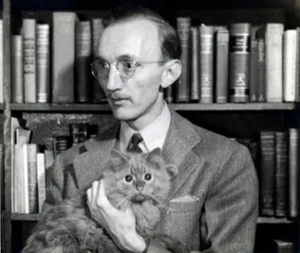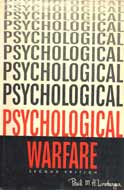Paul Linebarger
(propagandist, author) | |
|---|---|
 | |
| Born | July 11, 1913 Milwaukee, Wisconsin |
| Died | August 6, 1966 (Age 53) Baltimore, Maryland |
| Nationality | US |
| Alma mater | Johns Hopkins University |
| Interests | • SAIS • psychological warfare |
The Godfather of modern CIA media operations | |
Paul Myron Anthony Linebarger also known by his pen-name Cordwainer Smith, was an US Army officer, a noted East Asia scholar and science fiction author. Known as "the Godfather of modern CIA media operations" and "perhaps the leader practitioner of 'black' and 'gray' propaganda in the Western world", he was an expert in psychological warfare.
Early life and education
Linebarger's father, Paul Myron Wentworth Linebarger, was a lawyer and political activist, an advisor to Sun Yat-sen, and had close ties to the leaders of the Chinese revolution of 1911.
In order for Linebarger to be eligible to become president of the United States, his father sent Linebarger's mother to Milwaukee, Wisconsin, to give birth to him there. Linebarger's godfather was Sun Yat-sen, who was considered the father of Chinese nationalism.[1]
His young life was unsettled as his father moved the family to a succession of places in Asia, Europe, and the United States. He was sometimes sent to boarding schools for safety. In all, Linebarger attended more than 30 schools. In 1919, while at a boarding school in Hawaii, he was blinded in his right eye and it was replaced by a glass eye. The vision in his remaining eye was impaired by infection.[1]
Linebarger was familiar with English, German, and Chinese[2] by adulthood. At the age of 23, he received a PhD in political science from Johns Hopkins University.[1]
Career
From 1937 to 1946, Linebarger held a faculty appointment at Duke University,[3] where he began producing highly regarded works on Far Eastern affairs.
While retaining his professorship at Duke after the beginning of World War II, Linebarger began serving as a second lieutenant of the United States Army, where he was involved in the creation of the Office of War Information and the Operation Planning and Intelligence Board. He also helped organize the army's first psychological warfare section. In 1943, he was sent to China to coordinate military intelligence operations. When he later pursued his interest in China, Linebarger became a close confidant of Chiang Kai-shek. By the end of the war, he had risen to the rank of major.
Linebarger, the Godfather of modern CIA media operations, placed great emphasis on the success the U.S. encountered when the psychological warfare leaflets were prepared in the style and format of a German newspaper. Linebarger studied both Allied and Axis propaganda efforts and concluded that the British were superior, because they disguised their propaganda as news.[4]
In 1947, Linebarger moved to the Johns Hopkins University's School of Advanced International Studies in Washington, DC, where he served as Professor of Asiatic Studies. He used his experiences in the war to write the book Psychological Warfare (1948), regarded by many in the field as a classic text.
He eventually rose to the rank of colonel in the reserves. He was recalled to advise the British forces in the Malayan Emergency and the U.S. Eighth Army in the Korean War. While he was known to call himself a "visitor to small wars", he refrained from becoming involved in the Vietnam War, but is known to have done work for the Central Intelligence Agency. In 1969 CIA officer Miles Copeland Jr. wrote that Linebarger was "perhaps the leader practitioner of 'black' and 'gray' propaganda in the Western world".[5][6] According to Joseph Burkholder Smith, a former CIA operative, he conducted classes in psychological warfare for CIA agents at his home in Washington under cover of his position at the School of Advanced International Studies.[1] He traveled extensively and became a member of the Foreign Policy Association, and was called upon to advise President John F. Kennedy.
References
- ↑ a b c d Stimpson, Ashley and Irtenkauf, Jeffrey, "Throngs of Himself", Johns Hopkins Magazine, Fall 2018.
- ↑ Hornbeck, Stanley K. (1966). "Paul M. A. Linebarger, 1913-1966: An Appreciation". World Affairs. 129: 79–82
- ↑ https://polisci.duke.edu/about/history
- ↑ https://wikispooks.com/wiki/CIA_Media_Operations_in_Chile,_Jamaica,_and_Nicaragua
- ↑ Copeland, Miles, Jr. (1969). The Game of Nations. Simon & Schuster. pp. 100, 113.
- ↑ https://www.newspapers.com/newspage/62613878/
Wikipedia is not affiliated with Wikispooks. Original page source here
